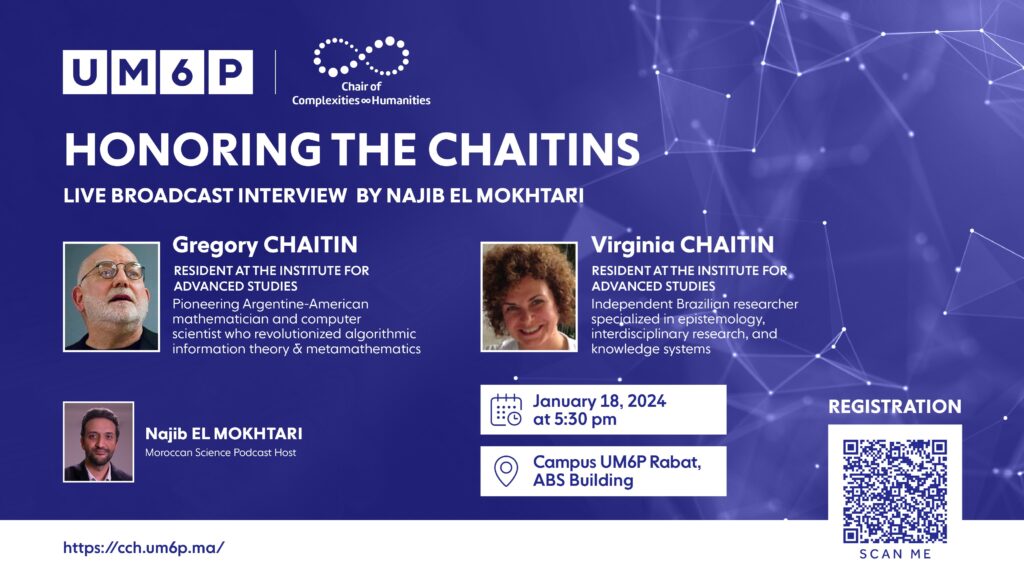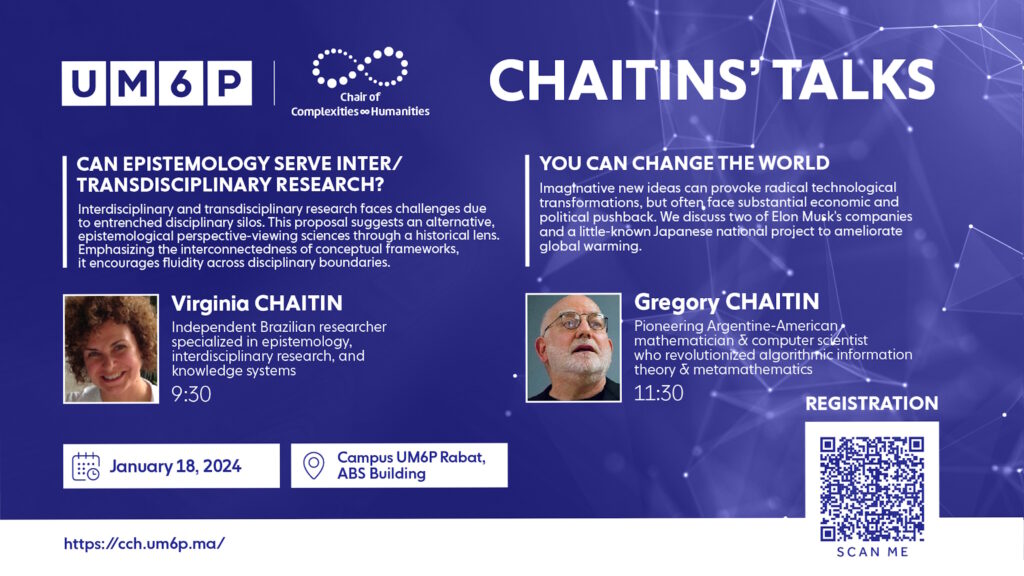Africa Business School, Rabat Campus, Thursday 18 January 2024
The Chair of Complexities ∞ Humanities is pleased to organize an event in Rabat to honor the work of an exceptional mathematician and computer scientist, Gregory Chaitin.
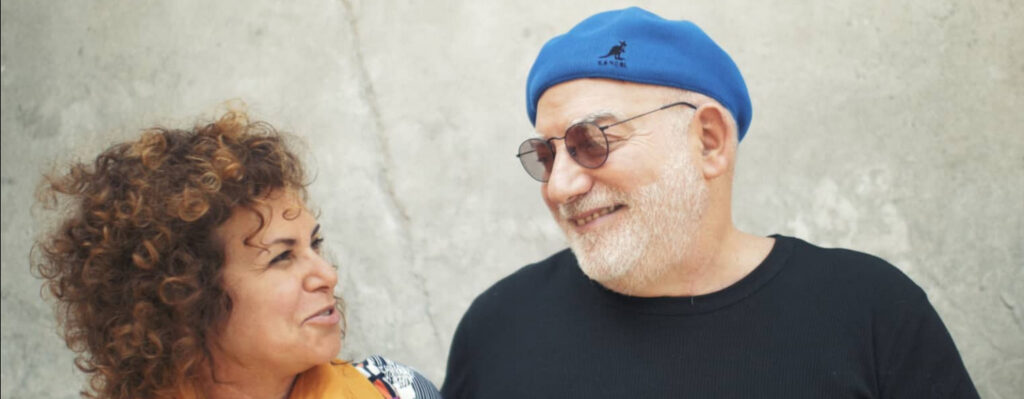
Gregory and his wife Virginia, a historian and philosopher of sciences, are residents at the UM6P Institute for Advanced Studies for the year 2023-24, bringing their scientific background and life experience to the UM6P community of students, faculty, and researchers. During this event in Rabat, we will have a live broadcast interview of Greg and Virginia, tracing their background, professional life, and research interests. The interview will be an opportunity to discover a fascinating mathematical and philosophical universe.
[click to enlarge]
Abstracts & Bios
Virginia Chaitin. Can epistemology be helpful for inter and transdisciplinarity research?
Short Abstract
Interdisciplinary and transdisciplinary research (IDTR) as well as interdisciplinary and cross disciplinary team-projects are often seen as challenging because of traditional disciplinary silos in the academic and professional worlds. In spite of this, contemporary problems such as food security, water supply and disease control are inherently complex requiring interdisciplinary and often cross disciplinary approaches. Notwithstanding the growing number and need for IDTR teams in academic research, in business, as well as in the design of public policies, it is not uncommon to have considerable difficulty in convincing researchers and professionals to undertake this kind of approach in their projects. In order to facilitate the acceptance of IDTR in the academic realm, we propose an alternative, epistemological perspective. Let us view the sciences through the lens of a history of ideas in which different conceptual frameworks and methodologies organize into disciplines. We emphasize that disciplines and research areas are not isolated bodies of knowledge but conceptual networks that actually evolve together as part of the more general human quest for knowledge. Within our framework, disciplinary boundaries are in fact permeable and concepts can be made to cross these permeable disciplinary boundaries. We put forth the applicability of this epistemic perspective in facilitating IDTR.
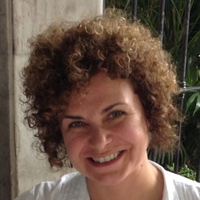 Virginia Chaitin is currently an independent researcher, and for the 2023/2024 academic year will be in residence at the Institute for Advanced Studies at the UM6P in Benguerir. Her current research topics are an epistemic evaluation of metabiology, epistemological criteria for inter and transdisciplinary research, different knowledge systems based on different forms of rationality, comparing and contrasting Paul Dirac’s and Paul Feyerbeand’s philosophy of science, and exploring the synergy between 20th century artistic movements and Feyerabend’s pluralistic philosophy. She is also working to organize the philosopher of science Paul K. Feyerabend Centennial 2024 events as a member of the International Steering Committee.
Virginia Chaitin is currently an independent researcher, and for the 2023/2024 academic year will be in residence at the Institute for Advanced Studies at the UM6P in Benguerir. Her current research topics are an epistemic evaluation of metabiology, epistemological criteria for inter and transdisciplinary research, different knowledge systems based on different forms of rationality, comparing and contrasting Paul Dirac’s and Paul Feyerbeand’s philosophy of science, and exploring the synergy between 20th century artistic movements and Feyerabend’s pluralistic philosophy. She is also working to organize the philosopher of science Paul K. Feyerabend Centennial 2024 events as a member of the International Steering Committee.
Virginia’s field is epistemology and she has proposed a methodology for interdisciplinary research involving mimetic (non-isomorphic) concept migration, and, in cases involving different systems of knowledge, multiple rationalities. For her post-doc at the UFRJ she applied her interdisciplinary methodology to the field of metabiology proposed by Gregory Chaitin.
She has a Doctoral Degree in the History of Science and Technology, and Epistemology – HCTE at the Federal University of Rio de Janeiro – UFRJ (2009), a Master’s Degree in Philosophy at the Pontificial Catholic University of Rio de Janeiro – PUC/RJ (2004) and in Logic and Scientific Method at the London School of Economics and Political Science – LSE (1995). Her Bachelor’s Degree is in Statistics at the University of Brasilia – UnB (1985).
https://independent.academia.edu/VirginiaChaitin
_________________________________
Gregory Chaitin. You can change the world
Abstract
Imaginative new ideas can provoke radical technological transformations, but often face substantial economic and political pushback. We discuss two of Elon Musk’s companies and a little-known Japanese national project to ameliorate global warming.
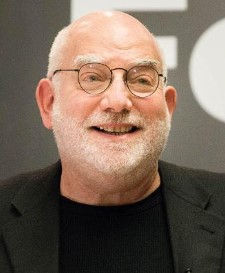 Gregory Chaitin, born in 1947, is an Argentine-American mathematician and computer scientist. From the late 1960s onward, he has made significant contributions to algorithmic information theory and metamathematics, including a notable result in computer theory analogous to Gödel’s incompleteness theorem. Chaitin, along with Andrei Kolmogorov and Ray Solomonoff, is viewed as one of the pioneers of the algorithmic complexity field, often referred to as Solomonoff-Kolmogorov-Chaitin complexity or program-size complexity. The emergence of algorithmic information theory as a core aspect of theoretical computer science, information theory, and mathematical logic owes much to the contributions of figures like Solomonoff, Kolmogorov, Martin-Löf, and Leonid Levin. This subject is frequently taught in computer science courses. Beyond just computer scientists, Chaitin’s research has garnered the interest of numerous philosophers and mathematicians, leading them to explore profound questions in mathematical innovation and digital philosophy.
Gregory Chaitin, born in 1947, is an Argentine-American mathematician and computer scientist. From the late 1960s onward, he has made significant contributions to algorithmic information theory and metamathematics, including a notable result in computer theory analogous to Gödel’s incompleteness theorem. Chaitin, along with Andrei Kolmogorov and Ray Solomonoff, is viewed as one of the pioneers of the algorithmic complexity field, often referred to as Solomonoff-Kolmogorov-Chaitin complexity or program-size complexity. The emergence of algorithmic information theory as a core aspect of theoretical computer science, information theory, and mathematical logic owes much to the contributions of figures like Solomonoff, Kolmogorov, Martin-Löf, and Leonid Levin. This subject is frequently taught in computer science courses. Beyond just computer scientists, Chaitin’s research has garnered the interest of numerous philosophers and mathematicians, leading them to explore profound questions in mathematical innovation and digital philosophy.
Gregory Chaitin is author of Information, Randomness & Incompleteness (1987) Algorithmic Information Theory (1987) The Limits of Mathematics (1998), The Unknowable (1999), Exploring Randomness (2001), Meta Math!: The Quest for Omega (2005), Mathematics, Complexity and Philosophy (2011), Gödel’s Way (2012) and Proving Darwin: Making Biology Mathematical (2012).
_________________________________
Gregory and Virginia Chaitin: Against Method
Fashion is evil. Fight the system – or at least ignore it. A portrait of the prodigy mathematician and computer scientist Gregory Chaitin, who tries to invent a theory of creativity.
Documentary, 46 minutes, 2015
Director and Scenario : Karol Jalochowski
Casting: Gregory and Virginia Chaitin

